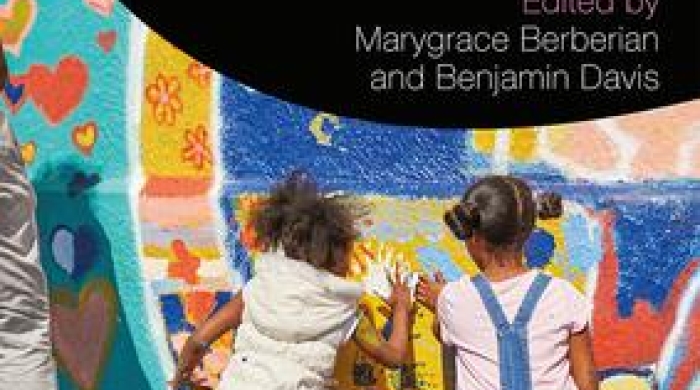Still Accepting Applications
About the MA in Art Therapy
Psychotherapy and visual arts practice are integrated to engage the creative power of art for clinical assessment and treatment. We promote scholarly research and evidence-based clinical praxis, cross-cultural competency with appreciation of social justice, and fluency with evolving technologies.
Request InfoDegree Details
Official Degree Title
Degree Goal
To prepare competent entry-level art therapists in the cognitive (knowledge), psychomotor (skills), and affective (behavior) learning domains.
Degree Objectives
Cognitive (Knowledge)
You will develop a robust knowledge of clinical theory, with a solid grasp of psychodynamics. You will master the professional Ethics Code that guides clinical thinking in challenging situations.
Psychomotor (Skills)
You will learn to practice art therapy with diverse populations and acquire multicultural competency that reflects attunement to current global social justice issues.
Affective (Attitudes/Behaviors)
You will develop an identity as both an art therapist and a practicing artist, developing the clinical attunement, compassion, and acuity that is only fully realized by cultivating profound personal creativity.
The degree requires a total of 60 credits to graduate; 39 credits are core art therapy courses and 12 credits are internship. The remaining 9 credits are psychology electives, chosen from a wide variety of courses offered in other NYU graduate programs as well as local consortium universities.
The cohort sequence is designed to optimize preparation for clinical practice. For the first term, you will take two foundation courses. The first is Art for Art Therapists, a studio-based class. Here, you will have the opportunity to understand and interpret your own creative processes and products, which is essential for understanding your own clinical transference/countertransference issues. The second foundation course is Theory and Practice of Art Therapy. This course combines didactic classroom learning with a fieldwork component that allows you to ease into clinical work gradually. Specifically, you will observe credentialed art therapists working in metropolitan clinical settings and begin to lead treatment for 85–100 hours in this first semester.
Your Final Project
In addition to course work and internship requirements, students in Art Therapy must complete a substantial thesis project that demonstrates both theoretical knowledge and accumulated clinical experience. Upon completion of the thesis, you will present your work in a mini-conference. This is a full-day event, and student presenters are encouraged to invite family, friends, and colleagues.
Our degree takes full advantage of the wide variety of training opportunities available in New York, the art center of the world with one of the most diverse and richly complex health systems in the country. Experts in the field of mental health provide students with excellent opportunities for internships in a variety of renowned settings for training and career advancement.
We also support the continued growth and development of art therapists. We have post-master’s courses for working professionals and many graduates maintain a connection with our program as field supervisors, creating additional art therapy positions. In addition, we offer conferences and continuing education courses in the field of psychiatry, psychology, and creative arts therapies focusing on contemporary, evidence based mental health practices.
Graduates are successfully establishing private practices in communities. Best practices are evident through conference presentations and publications.
Commission on Accreditation of Allied Health Education Program
The Art Therapy program is accredited by the Commission on Accreditation of Allied Health Education Programs upon the recommendation of the Accreditation Council for Art Therapy Education.
Commission on Accreditation of Allied Health Education Programs
25400 US Highway 19 North, Suite 158
Clearwater, FL 33763
727-210-2350
Student Outcomes Data
Academic Year 2023-2024
- # of graduated - 18
- Retention Rate - 100%
- Positive Placement Percentage* - 100%
- Employment Knowledge Rate**- 77.8%
Academic Year 2022-2023
- # of graduated - 32
- Retention Rate - 96%
- Positive Placement Percentage* - 90.91%
- Employment Knowledge Rate**- 68.75%
Academic Year 2021-2022
- # of graduated - 9
- Retention Rate - 94%
- Positive Placement Percentage* - 100%
- Employment Knowledge Rate** - 56%
Academic Year 2020-2021
- # of graduated - 9
- Retention Rate - 100%
- Positive Placement Percentage* - 100%
* “Positive Placement Percentage” means that the graduate is employed full or part-time in art therapy or in a related field; or continuing his/her education; or serving in the military. A related field is one in which the individual is using cognitive, psychomotor, and affective competences acquired in the education program.
**Employment Knowledge Rate - CAAHEP requires all accredited programs to share the “Employment Knowledge Rate,” which is the response rate to the survey of program graduates. 56% of those surveyed responded, leading to a 56% Employment Knowledge Rate.
Questions
If you have any additional questions about our degree, please feel free to contact us at Art-Therapy-Info@nyu.edu

Art and Art Professions
Barney Building
34 Stuyvesant Street, New York, NY 10003
212-998-5700
nyuart@nyu.edu
Take the Next Step
Advance your personal and professional journey – apply to join our community of students.
Apply Now
